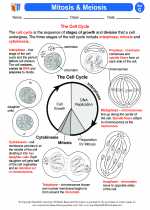Cell Reproduction -> appreciation
Appreciation in Science
Appreciation in science refers to recognizing and understanding the value, importance, or significance of something in the natural world. It involves acknowledging the beauty, complexity, and interconnectedness of the various elements that make up our environment.
Key Concepts in Appreciation
- Biodiversity: Appreciating the diversity of living organisms and their ecosystems, and understanding the role they play in maintaining the balance of nature.
- Natural Processes: Recognizing the intricate processes that occur in the natural world, such as the water cycle, photosynthesis, and nutrient cycling, and understanding their impact on the environment.
- Interdependence: Appreciating the interdependence of living organisms and their environments, and understanding how changes in one component can affect the entire ecosystem.
- Sustainability: Recognizing the importance of preserving and conserving natural resources for the well-being of current and future generations.
Why is Appreciation Important in Science?
Appreciation is essential in science because it fosters a deeper understanding of the natural world and promotes environmental stewardship. By appreciating the beauty and complexity of nature, individuals are more likely to take actions to protect and conserve the environment.
Study Guide
Here are some key points to focus on when studying the topic of appreciation in science:
- Define appreciation in the context of science and provide examples of how it applies to different aspects of the natural world.
- Explain the concept of biodiversity and why it is important for the health of ecosystems.
- Describe the natural processes that occur in the environment and their significance for sustaining life on Earth.
- Discuss the interdependence of living organisms and their environments, and provide examples of ecological relationships.
- Examine the concept of sustainability and its relevance to the responsible use of natural resources.
- Explore case studies or real-world examples of how appreciation has influenced conservation efforts or environmental policy.
By understanding and internalizing the concept of appreciation in science, students can develop a deeper connection to the natural world and become advocates for environmental protection and sustainability.
.◂Science Worksheets and Study Guides Seventh Grade. Cell Reproduction

 Activity Lesson
Activity Lesson
 Worksheet/Answer key
Worksheet/Answer key
 Worksheet/Answer key
Worksheet/Answer key
 Worksheet/Answer key
Worksheet/Answer key
 Vocabulary/Answer key
Vocabulary/Answer key
 Vocabulary/Answer key
Vocabulary/Answer key
 Vocabulary/Answer key
Vocabulary/Answer key
 Vocabulary/Answer key
Vocabulary/Answer key
 Vocabulary/Answer key
Vocabulary/Answer key
 Vocabulary/Answer key
Vocabulary/Answer key
 Vocabulary/Answer key
Vocabulary/Answer key
 Vocabulary/Answer key
Vocabulary/Answer key
